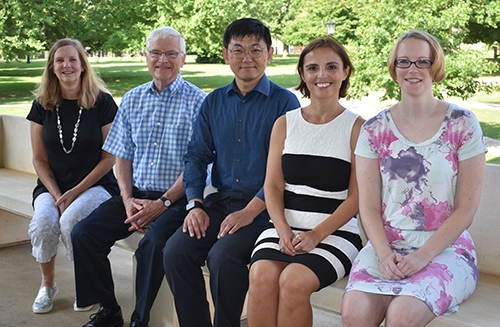
A University of Arkansas professor and alumnus have co-edited a special issue of the Journal of Vocational Rehabilitation that covers the new area of emerging disabilities. Lynn Koch is a professor of counselor education in the College of Education and Health Professions, and Phillip Rumrill, who earned a doctorate from the U of A in 1993, directs the Center for Disability Studies at Kent State University in Ohio.
The articles in the special issue address a wide range of medical, psychosocial and vocational issues facing people with emerging disabilities, which are defined as conditions that are either new to medical science or are increasing in incidence and prevalence. All of the authors are affiliated with the Department of Rehabilitation, Human Resources and Communication Disorders at the U of A.
Vocational rehabilitation professionals are uniquely qualified to provide many of the services and supports that people with emerging disabilities need in making career-related decisions and in their efforts to seek, secure and maintain employment, Koch and Rumrill wrote in the introduction.
However, people with emerging disabilities are often underserved by both the public and private sectors and represent a clientele whose needs must be better understood by rehabilitation researchers, policymakers, educators and practitioners.
Rick Roessler, emeritus professor, co-wrote a chapter with Rumrill and two other Kent State University researchers titled "Employment retention expectations of working adults with multiple sclerosis: A multinomial logistic regression analysis." Roessler researched multiple sclerosis and employment barriers for years with a series of federal grants that he began receiving when Rumrill was his student at the U of A.
MS is a neurological disorder characterized by a wide variety of symptoms ranging from fatigue to cognitive limitations, and it often results in premature exit from the workforce because of both the complexity and unpredictable nature of its symptoms. The article described a survey examining factors that influence the employment expectations of adults with MS.
Having a concrete depiction of the factors influencing how their clients cope with the symptoms of MS in their efforts to retain employment is useful to rehabilitation counselors in both diagnosis and treatment, the authors wrote. The study's findings can help counselors identify people at high risk of leaving their jobs and then provide them with high priority services to address that risk.
Julie Hill, a doctoral student in the counselor education program, was lead author with Koch and Rumrill on an article titled "Ethical considerations for providing vocational rehabilitation services to individuals with chronic pain."
The authors defined chronic pain, provided examples of chronic illnesses and disabilities associated with chronic pain, examined the demographic characteristics of individuals with the highest rates of chronic pain, discussed common myths about chronic pain, and discussed sections of the 2017 Code of Professional Ethics for Rehabilitation Counselors that are especially relevant to providing services to this growing clientele.
Misunderstandings and misperceptions about people experiencing chronic pain have led to stigma, and vocational rehabilitation professionals have an ethical responsibility to serve this population with the same care and professionalism as they do with people from any other chronic illness or disability population, the authors concluded.
Stephanie Lusk, an associate professor in the counselor education program, and Addyson Stipp, a recent graduate of the master's degree program, co-wrote an article titled "Opioid use disorders as an emerging disability."
Lusk and Stipp explored how opioid use disorders develop and those at most risk of developing opioid use disorders by discussing the unique pharmacology of opioids and how they increase the propensity of addiction. They also discussed terms of treatment — such as types of treatment, recovery-oriented services, and alternative or complementary forms of treatment — as well as considerations for addressing some of the challenges of working with these individuals.
Having a working understanding of chronic pain conditions and their many accompanying complicating factors — increased potential for addiction, lack of treatment access and participation, and co-occurring psychiatric conditions — allows vocational rehabilitation counselors to inform and guide the consumer in making decisions that best meet their needs, the authors concluded.
Koch wrote an article about disabilities and college enrollment with U of A colleagues Wen-Juo Lo, associate professor of educational statistics and research methods, and Kate Mamiseishvili, professor of higher education, recent graduate Donghun Lee and doctoral student Julie Hill. In "The effect of learning disabilities, attention deficit hyperactivity disorder, and psychiatric disabilities on three-year persistence outcomes at four-year higher education institutions," the authors wrote that increasing numbers of youth being diagnosed with learning disabilities, attention deficit hyperactivity disorder and psychiatric disabilities are enrolling in U.S. colleges and universities.
The authors analyzed data from a student survey in a national dataset, finding that students with these disabilities had a greater chance of dropping out than students without disabilities even though they were found not to have many of the typical at-risk demographic characteristics such as being from low-income families, being first-generation students or being students of color. They seemed to be more socially and academically integrated but still had lower persistence rates than students who did not report having a disability.
Having a postsecondary education can lead to better employment prospects so vocational rehabilitation counselors should encourage students with these disabilities to attend colleges and universities, the authors concluded. Their academic challenges and needs must be assessed to ensure they have adequate support to achieve their academic goals.
Topics
Contacts
Heidi S. Wells, director of communications
College of Education and Health Professions
479-575-3138,